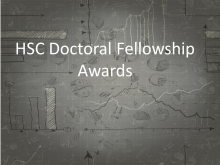
Research improves professional practice and benefits HSC service users. People expect the services they receive to be informed by high quality research. Health and Social Care (HSC) needs a core of active, skilled researchers who can advance our knowledge about illness, how the human body and mind work, and how we can better prevent and treat diseases and conditions.
The HSC R&D Fellowships support excellent, early career professionals to understand how to undertake research in health or social care environments.
Four new research Fellowships, which will lead to a PhD, have been awarded in 2016.
These four successful research fellows are all working within well-established health and social care research centres in Northern Ireland and have presented high quality research proposals, the results of which, will be used to improve future health and social services in Northern Ireland. The fellows also have the opportunity to undertake an intensive and bespoke training programme to develop their expertise as HSC researchers.
Miss Anita Harron, a Speech and Language Therapist in the Belfast Health and Social Care Trust will undertake her research training in the area of early intervention for children in schools. We know that low school achievement leads to poor employment which is linked to mental and physical health issues. Teams of health professionals already work with schools to address barriers to learning, but it is often difficult for these teams to know which programmes work best for which children. Anita’ research plans to develop and test a whole class programme for 4-5 year olds, which aims to enhance children’s working memory and improve attention and language skills which are strongly linked to achievement.
Ms Anne Fee, a Carers Co-ordinator in the Northern Health and Social Care Trust, will research the area of family carers. The health service has increasingly emphasised the importance of care in the community, but research has already shown that support for carers and in particular older male carers, is often not successful. Anne’s project aims to understand the experience and support needs of older male carers who are looking after a spouse/partner with a long term condition and then use this information to develop and test a programme that will support them.
Ms Katrin Lehmann, a Clinical Nurse Specialist in the Child and Adolescent Mental Health Service in the Belfast Health and Social Care Trust will undertake research to explore the issue of autism and gender dysphoria. In the last five years there has been a significant increase in the number of people referred to the Gender Identity Service in NI, and it is recognised that providing an appropriate service is complex, requiring improved clinical pathways, skills and knowledge, and flexible treatment options. Katrin’s research aims to examine the pathways and outcomes for people who may have autism and are referred to gender identity services in NI. She will research this area from a range of service user, family and clinical perspectives and ultimately use this to inform the development of person-centred gender identity service.
Dr Laura Feeney, a Medical Oncology Specialty Registrar in the Belfast Health and Social Care Trust will carry out a research study to look at developing an early warning test for ovarian cancer. Ovarian cancer is the fifth most common cause of cancer death in women. The five-year survival rate of just 43% has not got better over the last 30 years, despite improvement in various treatments. One problem is that it is generally detected too late and this greatly limits successful treatment. Laura’s research will look for ways to detect one of the most aggressive forms of ovarian cancer (High Grade Serous Carcinomas) much earlier, with the hope that this will enable clinicians to commence treatment much earlier and consequently increase the survival of women with this devastating disease.

